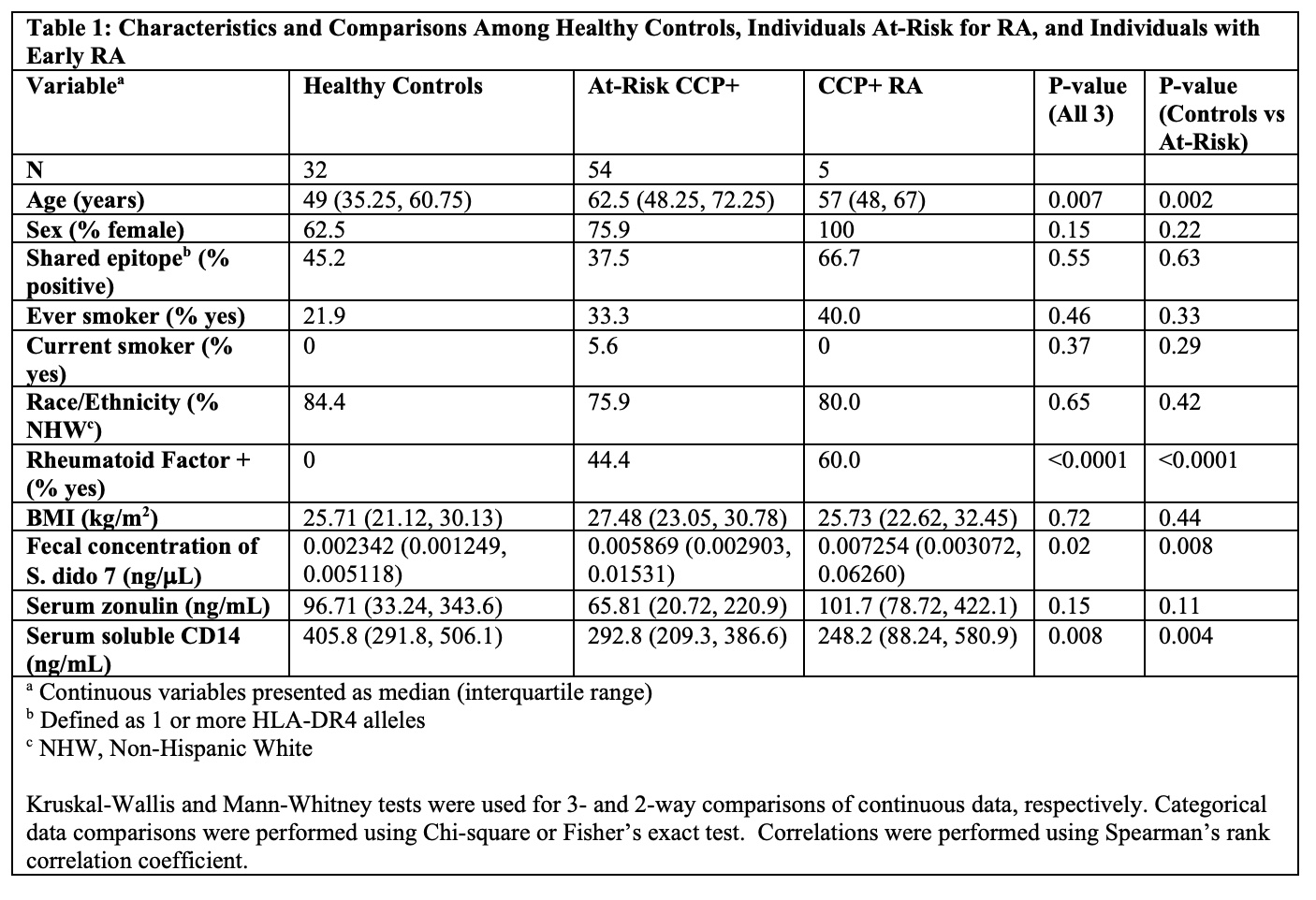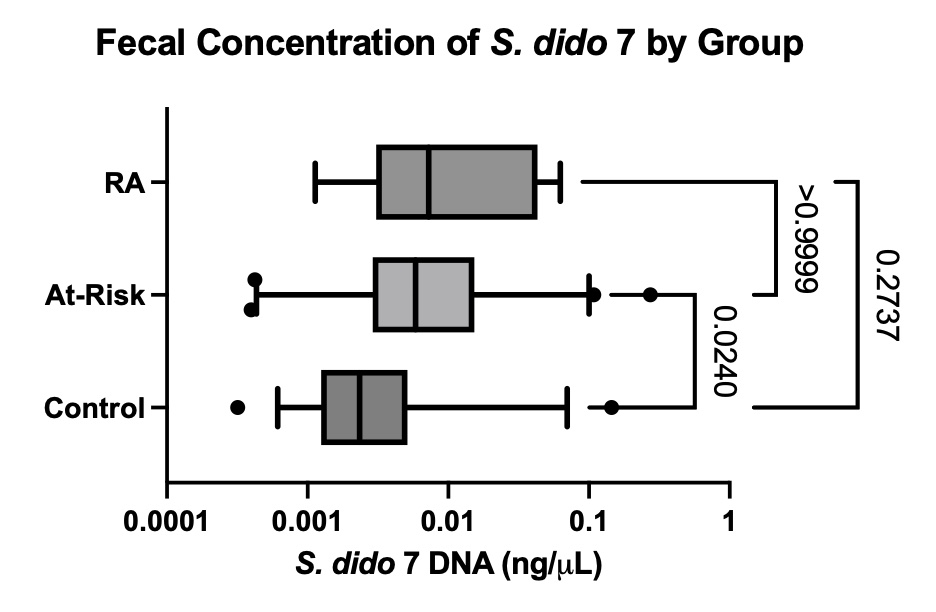Session Information
Session Type: Poster Session C
Session Time: 9:00AM-11:00AM
Background/Purpose: Our prior investigation identified a specific strain of Subdoligranulum didolesgii, S. dido7, to which dual IgA/IgG family plasmablast-derived monoclonal autoantibodies from individuals at-risk for RA show cross-reactivity with RA-relevant autoantigens. S. dido7 stimulated CD4+ T cell activation in individuals with RA. Also, it led to inflammatory arthritis (IA) in mono-colonized germ-free mice and Th17 cell expansion, RA-relevant IgG autoantibody production and colon-isolated lymphoid follicle abundance [1]. In this study, we sought to assess the prevalence and compare the fecal concentration of S. dido7 among healthy controls vs. individuals at-risk and with early RA and its association with CCP3 antibodies and biomarkers of intestinal permeability, zonulin and soluble CD14.
Methods: Stool and sera were prospectively collected from 3 groups: 1) ‘At-Risk’ individuals, defined as those with positive CCP3 with no history of nor current IA (n=54), 2) individuals with CCP3(+) RA based on 2010 ACR/EULAR criteria within 12 months of diagnosis (n=5) and 3) controls without IA or RF/CCP3 positivity (n=32). Exclusion criteria included antibiotics in the 3 months prior to sample collection. Fecal DNA was extracted using a commercial kit (Qiagen). Quantitative PCR was used to create a standard curve using known concentrations of S. dido7 to allow for calculation of strain-specific fecal levels in individual samples. Serum CCP3 ELISA (Werfen) was used to measure CCP IgG. Serum ELISAs (Cusabio) were used to quantitate serum zonulin and soluble CD14.
Results: Demographics are summarized in Table 1. There were no significant differences across the groups apart from age. Fecal concentration of S. dido7 was 2.5-fold higher in At-Risk individuals and 3.1-fold higher in early RA compared to controls (p=0.02; Figure 1). Higher serum CCP3 levels significantly correlated with higher fecal S. dido 7 concentration (p=0.005; Table 2). Serum CD14 but not zonulin was significantly lower in At-Risk individuals and early RA (p=0.008; Table 1). Higher zonulin significantly correlated with lower fecal S. dido7 concentration (p=0.002; Table 2). There was no significant correlation between fecal S. dido7 and serum soluble CD14 or age (Table 2).
Conclusion: These data, along with prior data demonstrating arthritogenic potential of this bacterial strain, suggestS. dido7 may play an important mechanistic role in a subset of individuals during development of CCP autoantibodies and subsequent RA. Our data do not agree with others’ findings of impaired intestinal permeability that we hypothesized as a potential mechanism by whichS. dido7 may trigger autoimmunity. Future study is needed to address limitations, including validation of intestinal permeability studies and improvement in age- and sex-matching, as well as to evaluateS. dido7 in seronegative RA and its associations with clinical and biomarker features before and after arthritis development.
[1] Chriswell ME, Lefferts AR, Clay MR, et al. Clonal IgA and IgG autoantibodies from individuals at risk for rheumatoid arthritis identify an arthritogenic strain of Subdoligranulum. Sci Transl Med. 2022 Oct 26;14(668):eabn5166. doi: 10.1126/scitranslmed.abn5166. Epub 2022 Oct 26.
To cite this abstract in AMA style:
Cole L, Liu S, Allen B, Feser M, Demoruelle K, Deane k, Holer M, Kuhn k. Individuals At-risk for and with Rheumatoid Arthritis Have Elevated Fecal Concentrations of Arthritogenic Subdoligranulum didolesgii Correlating with CCP3 Antibodies [abstract]. Arthritis Rheumatol. 2023; 75 (suppl 9). https://acrabstracts.org/abstract/individuals-at-risk-for-and-with-rheumatoid-arthritis-have-elevated-fecal-concentrations-of-arthritogenic-subdoligranulum-didolesgii-correlating-with-ccp3-antibodies/. Accessed .« Back to ACR Convergence 2023
ACR Meeting Abstracts - https://acrabstracts.org/abstract/individuals-at-risk-for-and-with-rheumatoid-arthritis-have-elevated-fecal-concentrations-of-arthritogenic-subdoligranulum-didolesgii-correlating-with-ccp3-antibodies/



